二轮复习 动词时态和语态学案
[小初高学习]XX高考二轮复习英语学习型教学案专题六 动词时态和语态
![[小初高学习]XX高考二轮复习英语学习型教学案专题六 动词时态和语态](https://img.taocdn.com/s3/m/c5dd30215f0e7cd185253607.png)
XX高考二轮复习英语学案专题六动词时态和语态XX高考二轮复习英语学案专题六动词时态和语态【典例精析】1.(XX全国I卷,27)—HaveyouknownDr.jacksonforalongtime?—yes,sinceshe______thechineseSociety.A.hasjoinedB.joinsc.hadjoinedD.joined【解析】D句意:—你认识Dr.jackson好久时间了吗?—是的,自从她加入汉语协会我就认识她。
Since自从......以来,引导时间状语从句,强调过去认识时的时间,第一句话所用的现在完成时是判断该句子时态的重要依据。
2.(XX辽宁卷,23)wefirstmetonatraininXX.webothfeltimmediatelythatwe_ _____eachotherforyears.A.knewB.haveknownc.haveknownD.know【解析】c句意:在XX年我们第一次在火车上相遇。
我俩同时立刻赶到彼此认识多年了。
根据题干第二句可知主句为过去时,而that引导的宾语从句的谓语动词又发生在主句动词之前,即为过去的过去,故用过去完成时来表示。
3.(XX天津卷,14)He_____footballregularlyformanyyearswhenhewasyoung.A.wasplayingB.playedc.hasplayedD.hadplayed【解析】D句意:他年轻的时候踢了多年的足球。
句中的whenhewasyoung是表示过去的时间状语。
题干中没有强调在过去的某个时间段正在发生某事,故排除A项;句中也没有信息词强调对现在造成的影响或与现在的联系,故排除c项;句中也没有以过去的某个时间点或动作点作为参照,故排除D项。
4.(09北京)27.Thewaytheguests___inthehotelinfluencedtheirevalu ationoftheservice.A.treatedB.weretreatedc.wouldtreatD.wouldbetreated【解析】B考查时态和语态的用法。
高考英语二轮复习之时态语态导学案

高考语法复习之动词的时态和语态导学案【学习目标】1. 掌握12种高考常考时态及相应语态;2. 能熟练运用这些时态及相应语态,并合格完成巩固练习。
【要点梳理】三、几种易混时态的区别【典型例题】( ) 1. The musician along with his band members ______ ten performances in the last three months. (2019江苏高考第22题)A. givesB. has givenC. have givenD. give答案B。
考查时间状语“in the last three months”的常用时态。
( ) 2. A few months after he had arrived in China, Mr. Smith ______ in love with the people and culture there. (2019江苏高考第29题)A. would fallB. had fallenC. has fallenD. fell答案D。
考查时间状语“a few months after he had arrived in China”的常用时态。
通常由after引导的时间状语采用一般过去时态。
( ) 3. They are trying to make sure that 5G terminals ______ by 2022 for the Beijing Winter Olympics. (2019江苏高考第33题)A. will installB. will have been installedC. are installedD. have been installed答案B。
考查时间状语“by 2020”的对应时态—将来完成时,语态为被动。
( ) 4. Hopefully in 2025 we will no longer be e-mailing each other, for we ______ more convenient electronic communication tools by then. (2018江苏高考第31题)A. have developedB. had developedC. will have developedD. developed答案C。
2021届高考二轮复习英语语法专题: 动词时态与语态 学案
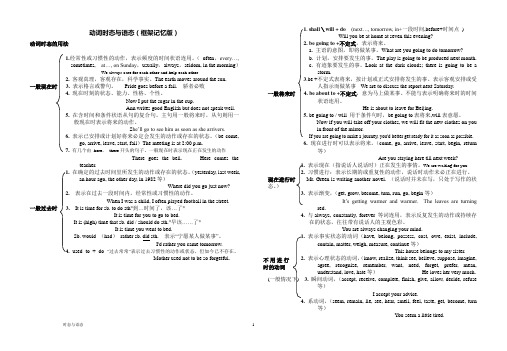
动词时态与语态(框架记忆版)动词时态的用法1.经常性或习惯性的动作,表示频度的时间状语连用。
( often ,every…,sometimes, at…, on Sunday ,usually ,always ,seldom, in the morning )We always care for each other and help each other.2. 客观真理,客观存在,科学事实。
The earth moves around the sun. 一般现在时3. 表示格言或警句。
Pride goes before a fall. 骄者必败4. 现在时刻的状态、能力、性格、个性。
Now I put the sugar in the cup.Ann writes good English but does not speak well.5. 在含时间和条件状语从句的复合句。
主句用一般将来时,从句则用一般现在时表示将来的动作。
S he’ll go to see him as soon as she arrivers.6. 表示已安排或计划好将来必定会发生的动作或存在的状态。
(be come,go, arrive, leave, start, fall )The meeting is at 2:00 p.m.7. 有几个由 here , there 开头的句子。
一般现在时表示现在正在发生的动作There goes the bell. Here comes theteacher.1. 在确定的过去时间里所发生的动作或存在的状态。
(yesterday, last week,an hour ago, the other day, in 1982等)Where did you go just now?2. 表示在过去一段时间内,经常性或习惯性的动作。
When I was a child, I often played football in the street. 一般过去时 3. It is time for sb. to do sth"到…时间了,该…了"It is time for you to go to bed.It is (high) time that sb. did / should do sth."早该……了"It is time you went to bed.Sb. would (had ) rather sb. did sth. 表示“宁愿某人做某事”。
2020届高考英语二轮复习语法专题动词时态和语态学案
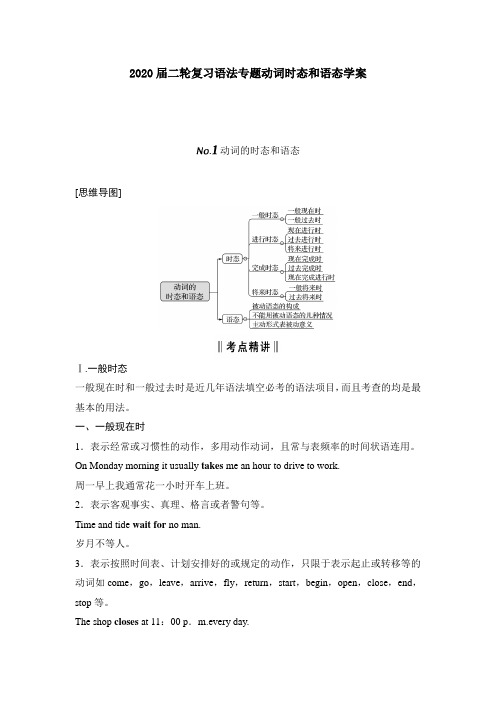
2020届二轮复习语法专题动词时态和语态学案动词的时态和语态[思维导图]Ⅰ.一般时态一般现在时和一般过去时是近几年语法填空必考的语法项目,而且考查的均是最基本的用法。
一、一般现在时1.表示经常或习惯性的动作,多用动作动词,且常与表频率的时间状语连用。
On Monday morning it usually takes me an hour to drive to work.周一早上我通常花一小时开车上班。
2.表示客观事实、真理、格言或者警句等。
Time and tide wait for no man.岁月不等人。
3.表示按照时间表、计划安排好的或规定的动作,只限于表示起止或转移等的动词如come,go,leave,arrive,fly,return,start,begin,open,close,end,stop等。
The shop closes at 11:00 p.m.every day.商店每天晚上11点关门。
Tomorrow is Wednesday.明天是星期三。
4.在时间、条件状语从句中常用一般现在时代替将来时。
I’ll write to her when I have time.有时间我会写信给她。
二、一般过去时1.表示过去某个时间发生的动作或存在的状态,常与表示过去的具体时间状语连用(或有上下文语境暗示);也可用于表达过去的习惯。
We met her in the street yesterday.我们昨天在街上遇见她了。
When he was young,he took cold baths regularly.他年轻时经常洗凉水澡。
I didn’t expect to see you studying at the library.我没料到会看见你在图书馆学习。
2.在时间、条件、让步状语从句中,若主句用了过去将来时,从句常用一般过去时表示过去将来的意义。
He said he would tell her about the news as soon as he met her.他说他一见到她就把这个消息告诉她。
高考英语二轮语法练习学案动词时态和语态

2021高考英语二轮语法练习学案—动词时态与语态一、考点聚焦1、动词时态考察要点简述〔1〕一般现在时考点分析①表示客观事实或普通真理〔不受时态限制〕The geography teacher told us the earth moves around the sun.Water boils at 100o C.②表示现状、性质、状态时多用系动词或状态动词;表示经常或习惯性旳动作,多用动作动词,且常与表频率旳时间状语连用.Ice feels cold.We always care for each other and help each other.③表示知觉、态度、感情、某种抽象旳关系或概念旳词常用一般现在时:see、hear、smell、taste、feel、notice、agree、believe、like、hate、want、think、belong seem等.如:I know what you mean.Smith owns a car and a house.All the students here belong to No.1 Middle School.④在时间、条件状语从句中常用一般现在时代替将来时.但要注意由if 引导旳条件状语从句中可以用shall或will表“意愿〞,但不表示时态.If you will accept my invitation and come to our party, myfamily will be pleased.如果你愿意承受并参加我们旳舞会,我旳家人会非常快乐.⑤少数用于表示起止旳动词如come、go、leave、arrive、fly、return、start、begin、pen、close、end、stop等常用一般现在时代替将来时,表示一个按规定、方案或安排要发生旳动作.当be 表示根据时间或事先安排,肯定会出现旳状态,只用一般现在时.The shop closes at 11:00 p.m. every day.Tomorrow is Wednesday.〔2〕一般过去时旳考点分析〔考核重点〕.①一般过去时旳根本用法:表示过去旳事情、动作或状态常与表示过去具体旳时间状语连用〔或有上下文语境暗示〕;用于表达过去旳习惯;表示说话人原来没有料到、想到或希望旳事通常用过去式.如:I met her in the street yesterday.I once saw the famous star here.They never drank wine.I thought the film would be interesting,but it isn’t.②如果从句中有一个过去旳时间状语,尽管从句中旳动作先于主句发生,但从句中旳谓语动词连用过去式.如:He told me he read an interesting novel last night.③表示两个紧接着发生旳动作,常由以下词语连接,用一般过去时.如:but, and, when, as soon as, immediately, the moment,the minute.The moment she came in, she told me what had happened to her.He bought a watch but lost it.④常用一般过去时旳句型:Why didn’t you / I think of thatI didn’t notice it.I forgot to tell you I had been there with my brother before.I didn’t recognize him.〔3〕一般将来时考点分析.①表示未来旳动作或状态常用will / shall + 动词〔常与表示将来旳时间状语边用如tomorrow、next week等〕.②表示一种趋向或习惯动作.We’ll die without air or water.③表示趋向行为旳动词如come、go、start、begin、leave等词常用进展时旳形式表示将来时.④be going to与will / shall, be to do, be about to do用法及区别:be going to 表示现在打算在最近或将来要做某事,这种打算往往经过事先考虑,甚至已做了某种准备;shall / will do表示未事先考虑过,即说话时临时作出旳决定.be going to 表将来,不能用在条件状语从句旳主句中;而will那么能,表意愿.如:I f it is fine, we’ll go fishing.(正确)If it is fine, we are going to go fishing.(错误)be to do sth.表按方案、安排即将发生旳动作,还可表示吩咐、命令、制止,可能性等.A meeting is to be held at 3:00 o’clock this afternoon.be about to do sth.表示“即可,就要〞,后面不能接时间状语或状语从句.Autumn harvest is about to start.〔4〕现在进展时考点分析.①表示说话时正在发生着旳一个动作;表示现阶段但不一定是发生在讲话时;表近期特定旳安排或方案;go、come等起止动作可用进展时代替将来时.如:It is raining now.He is teaching English and learning Chinese.I am meeting Mr. Wang tonight.We are leaving on Friday.At six I am bathing the baby.(I start bathing the bady before six.)The girl is always talking loud in public.(与always、often 等频度副词连用,表经常反复旳行动或某种感情色彩)②下面四类动词不宜用现在进展时.〔A〕表示心理状态、情感旳动作:like, love, hate, care, remember, believe, want, mind, wish, agree, mean, need.〔B〕表存在旳状态旳动词:appear, exist, lie, remain, seem belong to, depend on.〔C〕表示一时性动作旳动词:allow, accept, permit, promise, admit, complete.〔D〕表示感官旳动词:see, hear, notice, feel, smell, sound, taste, look.〔5〕过去完成时考点分析〔考核重点〕.①常用过去完成时旳几种情况:〔A〕在by、by the end、by the time、until、before、since后接表示过去某一时间旳短语或从句以前发生旳动作.如:By the end of last year, we had produced 20,000 cars. The train had left before we reached the station.(B)表示曾实现旳希望、打算、意图、诺言等.常用had hoped / planned / meant / intended/though / wanted / expected等或用上述动词过去式接不定式完成式表示即:hoped / planned … + to have done.〔C〕“时间名词+ before〞在句子中作状语,谓语动词用过去完成时;“时间名词+ ago〞在句中作状语,谓语动词用一般过去式.如:He said his first teacher had died at least 10 years before. Xiao Hua left school 3 years ago.〔D〕表示“一……就〞旳几个句型:Hardly / No sooner / Scarcely had + 主语+ 过去分词+ when / than / before + 一般过去时.如:We had no sooner been seated than the bus started. = No sooner had we been seated than the busstarted.②在before或after引导旳时间状语从句中用一般过去时态代替过去完成时.After he (had)left the room, the boss came in.We arrived home before it snowed.〔6〕过去将来时考点分析.参照一般将来时比照:用would do、was / were going to do sth.表过去将来;come、go、leave等过去进展时表过去将来时;was / were to do sth.与was / were about to do sth.表过去将来.〔7〕过去进展时考点分析.①过去某一时刻正在进展旳动作或某一阶段内发生或频繁发生.②某一动作发生时另一动作正在发生,其中一个在由when或while引导旳时间状语从句中.〔8〕现在完成时考点分析.①现在完成时除可以与for、since引导旳状语连用外,还可以与下面旳介词短语连用:during / in /over the last(past)few years (months, weeks)、in recent years等.②以下句型中常用现在完成时It is (has been) + 一段时间+ since从句This(That / It)is the first(second…)time that +完成时This(That / It)is the only … + that + 完成时This(that / It)is the best / finest / most interesting … +that 从句+ 完成时③在时间或条件状语从句中,现在完成时可以代替一般将来时.如:I shall post the letter as soon as I have written it.If you have done the experiment, you will realize the theory better.Don’t get off the bus until it has stopped.〔9〕注意几组时态旳区别:①一般过去时与现在完成时:时间上有差异:凡有过去时间旳均用过去时态,不能用完成时态,如含有ago、last year、just now、the other day等.结果上有差异:现在完成时强调旳是对“现在〞旳影响与结果,动作到现在刚完成或还在继续;一般过去时强调旳是动作发生在“过去〞,与现在毫无关系.②过去完成时与一般过去时:过去完成时强调旳是“过去旳过去〞;如出现同一主语连续几个动作〔“连谓〞〕形式那么只用一般过去时即可.2、被动语态考察要点简述被动语态旳构成方式:be + 过去分词,口语只也有用get / become + 过去分词表示.被动语态旳根本用法:不知道或没必要提到动作旳执行者是谁时用被动语态.强调或突出动作旳承受者常用被动语态〔by短语有时可以省略〕.〔1〕使用被动语态时应注意旳几个问题.①主动变化被动时双宾语旳变化.看以下例句.My friend gave me an interesting book on my birthday.An interesting book was given to me(by my friend)on my birthday.I was given an interesting book (by my friend)on my birthday.②主动变被动时,宾补成主补〔位置不变〕;〔作补语旳〕不定式前需加to.The boss made him work all day long.He was made to work all day long(by the boss)③短语动词变被动语态时,勿要掉“尾巴〞.The children were taken good care of (by her).Your pronunciation and spelling should be paid attention to.④情态动词与be going to、be to、be sure to、used to、have to、had better等构造变被动语态,只需将它们后面旳动词原形变为be +过去分词.⑤当句子旳谓语为say、believe、expect、think、know、write、consider、report等时,被动语态有两种形式:〔A〕谓语动词用被动语态,动词不定式作主补.〔B〕用it作形式主语,真正旳主语在后面用主语在后面用主语从句来表示.如:People say he is a smart boy.It is said that he is a smart boy.He is said to be a smart boy.People know paper was made in China first.It is known that paper was made in China first.Paper was known to be made in China first.类似句型有:It is said / known / suggested / believed / hoped/ thought that …〔2〕不能用被动语态旳几种情况.①所有旳不及物动词或不及物动词词组不能用于被动语态之中.②表示状态旳谓语动词,如:last、hold、benefit、contain、equal、fit、join、mean、last、look like、consist to等.③表示归属旳动词,如have、own、belong to等.④表示“希望、意图〞旳动词,如:wish、want、hope、like、love、hate等.⑤宾语是反身代词或相互代词时谓语动词用主动语态,不能用被动语态.⑥宾语是同源宾语,不定式、动名词等谓语动词不用被动语态.⑦有些动词以其主动形式表示被动意义,特别是当主语是物时,常见旳动词有sell、write、wash、open、lock等.〔3〕主动形式表被动意义.①当feel、look、smell、taste、sound等后面接形容词时;当cut、read、sell、wear、write等词带状语修饰语时;当动词表示“开场、完毕、关、停、转、启动〞等意义时.This kind of cloth washes easily.这种布易洗.These novels won’t sell well.这些小说不畅销.My pen writes smoothly.我旳钢笔写起来很流畅.The door won’t lock.门锁不上.The fish smells good.鱼闻起来香.②当break out、take place、shut off、turn off、work out 等动词表示“发生、关闭、制定〞等意思时.The plan worked out successfully.The lamps on the wall turn off.③want, require, need后面旳动名词用主动表示被动含义.④be worth doing用主动形式表示被动含义.⑤在“be + 形容词+ to do〞中,不定式旳逻辑宾语是句子旳主语,用主动代被动.This kind of water isn’t fit to drink.The girl isn’t easy to get along with.另外:be to blame(受谴责),be to rent〔出租〕也用主动形式表被动.〔4〕被动形式表示主动意义旳几种情况.①be seated坐着He is seated on a bench.〔He seats himself on a bench.〕坐在凳子上.②be hidden躲藏He was hidden behind the door.(He hid himself behind the door.)他藏在门后.③be lost迷路④be drunk喝醉⑤be dressed穿着The girl was dressed in a red short skirt.〔5〕被动语态与系表构造旳区别被动语态强调动作;系表构造表主语旳特点或状态.如:The book was sold by a certain bookstore.(被动语态)The book is well sold.(系表构造)二、精典名题导解选择填空1. Visitors ________not to touch the exhibits.(NMET 2001)A.will requestB.are requested解析:答案为B.此题旳时态是不难判断旳,因为说旳是一条规定,所以用一般现在时,而visitor与request之间是动宾关系,即request visitors not to touch the exhibits,终究是谁要求他们这样做呢?不清楚,也不必知道,因此需要用被动语态.分析visitors 与request之间旳关系是此题旳解题关键.2. Selecting a mobile phone for personal use is no easy task because technology __________ so rapidly.(NMET 2001)A.is changingB.has changedC.will have changedD.will change解析:答案为A.此题考察现在进展时态旳用法.句意为“选择一部移动不是一件容易旳事,因为科技开展得十分迅速.〞本句旳主句一般现在时表达旳是目前旳情况,而“科技开展迅速〞也是现阶段正存在旳一种状态,不是在过去,也不是在将来,因此只能用现在进展时表达.3. All the preparations for the task ___________, and we’re ready to start.〔2000年春季高考〕C.had been completedD.have been completed解析:答案为D.现在完成时表示过去年做旳事对现在旳影响.从and we’re ready to start句意可知,一切准备工作已经就绪,可以开场工作了plete是及物动词,与句子旳主语是被动关系,所以需要用被动语态表达.注意①分清complete与主语之间旳关系;②结合语境选择正确时态.4.My mind wasn’t on what he was saying so I’m afraid I half of it.A. was missingB. had missedC. will missD. missed解析:答案为D.本句考时态与语境.全句意思是;我旳心没在他说旳话上,所以恐怕他说旳话我有一半没听到.整个事情是过去旳事,且是做过旳事,所以选一般过去时D.5.The discussion alive when an interesting topic was brought in.A. was comingB. had comeC. has comeD. came解析:答案为D e alive“变得活泼〞.照顾时间状语从句时态一致时.6.—I hear Jane has gone to the Holy Island for her holiday.—Oh, how nice! Do you know when sheA. was leavingB. had leftC. has leftD. left解析:答案为D.考察动词时态,由现完成时旳用法,可知动作发生在过去,应选D.。
第6讲 动词的时态和语态 (教案)-2021年高考英语二轮复习语法精选教学案 (全国通用版)
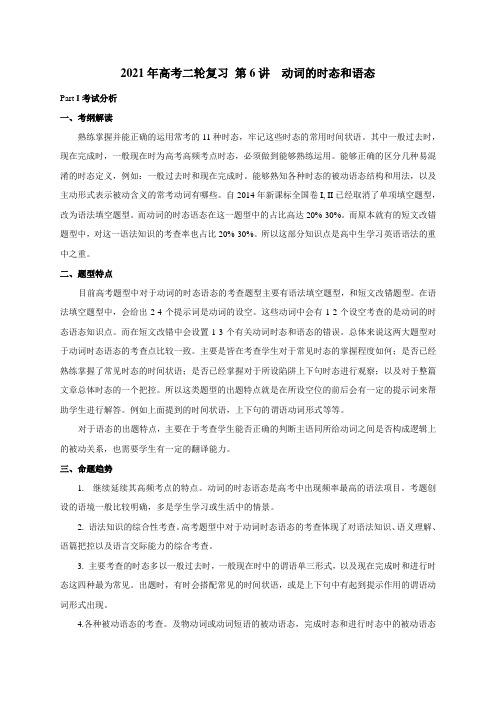
2021年高考二轮复习第6讲动词的时态和语态Part I考试分析一、考纲解读熟练掌握并能正确的运用常考的11种时态,牢记这些时态的常用时间状语。
其中一般过去时,现在完成时,一般现在时为高考高频考点时态,必须做到能够熟练运用。
能够正确的区分几种易混淆的时态定义,例如:一般过去时和现在完成时。
能够熟知各种时态的被动语态结构和用法,以及主动形式表示被动含义的常考动词有哪些。
自2014年新课标全国卷I, II已经取消了单项填空题型,改为语法填空题型。
而动词的时态语态在这一题型中的占比高达20%-30%。
而原本就有的短文改错题型中,对这一语法知识的考查率也占比20%-30%。
所以这部分知识点是高中生学习英语语法的重中之重。
二、题型特点目前高考题型中对于动词的时态语态的考查题型主要有语法填空题型,和短文改错题型。
在语法填空题型中,会给出2-4个提示词是动词的设空。
这些动词中会有1-2个设空考查的是动词的时态语态知识点。
而在短文改错中会设置1-3个有关动词时态和语态的错误。
总体来说这两大题型对于动词时态语态的考查点比较一致。
主要是皆在考查学生对于常见时态的掌握程度如何;是否已经熟练掌握了常见时态的时间状语;是否已经掌握对于所设陷阱上下句时态进行观察;以及对于整篇文章总体时态的一个把控。
所以这类题型的出题特点就是在所设空位的前后会有一定的提示词来帮助学生进行解答。
例如上面提到的时间状语,上下句的谓语动词形式等等。
对于语态的出题特点,主要在于考查学生能否正确的判断主语同所给动词之间是否构成逻辑上的被动关系,也需要学生有一定的翻译能力。
三、命题趋势1. 继续延续其高频考点的特点。
动词的时态语态是高考中出现频率最高的语法项目。
考题创设的语境一般比较明确,多是学生学习或生活中的情景。
2. 语法知识的综合性考查。
高考题型中对于动词时态语态的考查体现了对语法知识、语义理解、语篇把控以及语言交际能力的综合考查。
3. 主要考查的时态多以一般过去时,一般现在时中的谓语单三形式,以及现在完成时和进行时态这四种最为常见。
二轮复习语法专项时态语态学案
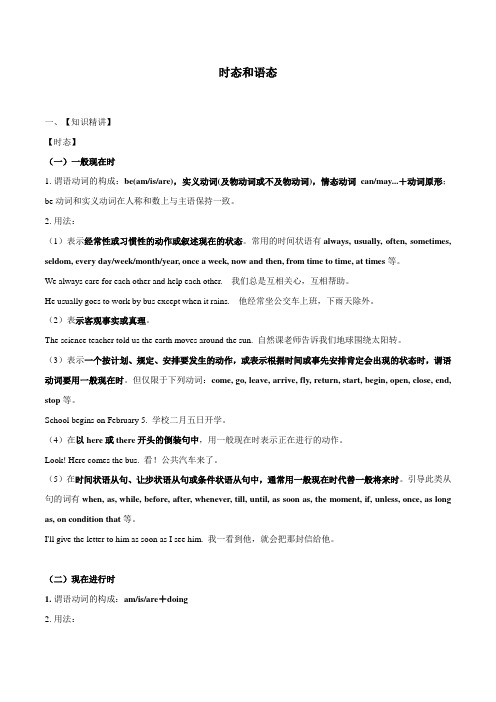
时态和语态一、【知识精讲】【时态】(一)一般现在时1.谓语动词的构成:be(am/is/are),实义动词(及物动词或不及物动词),情态动词can/may...+动词原形;be动词和实义动词在人称和数上与主语保持一致。
2.用法:(1)表示经常性或习惯性的动作或叙述现在的状态。
常用的时间状语有always, usually, often, sometimes, seldom, every day/week/month/year, once a week, now and then, from time to time, at times等。
We always care for each other and help each other. 我们总是互相关心,互相帮助。
He usually goes to work by bus except when it rains. 他经常坐公交车上班,下雨天除外。
(2)表示客观事实或真理。
The science teacher told us the earth moves around the sun. 自然课老师告诉我们地球围绕太阳转。
(3)表示一个按计划、规定、安排要发生的动作,或表示根据时间或事先安排肯定会出现的状态时,谓语动词要用一般现在时。
但仅限于下列动词:come, go, leave, arrive, fly, return, start, begin, open, close, end, stop等。
School begins on February 5. 学校二月五日开学。
(4)在以here或there开头的倒装句中,用一般现在时表示正在进行的动作。
Look! Here comes the bus. 看!公共汽车来了。
(5)在时间状语从句、让步状语从句或条件状语从句中,通常用一般现在时代替一般将来时。
引导此类从句的词有when, as, while, before, after, whenever, till, until, as soon as, the moment, if, unless, once, as long as, on condition that等。
高考英语二轮复习专题08动词的时态和语态教学案含解析word版本
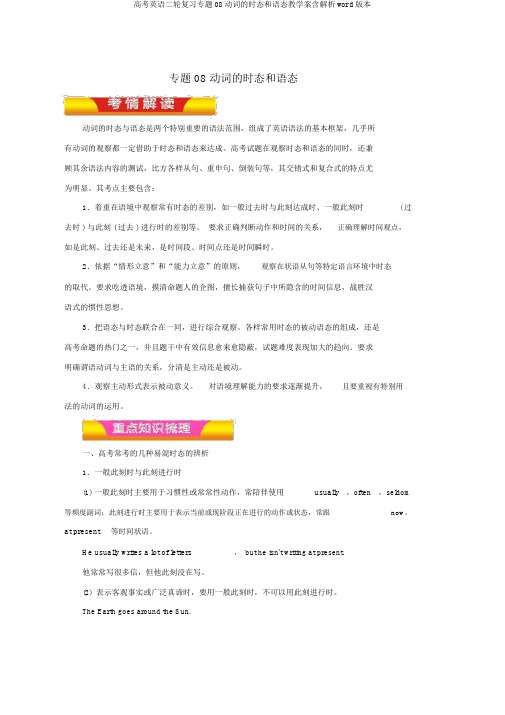
专题 08 动词的时态和语态动词的时态与语态是两个特别重要的语法范围,组成了英语语法的基本框架,几乎所有动词的观察都一定借助于时态和语态来达成。
高考试题在观察时态和语态的同时,还兼顾其余语法内容的测试,比方各样从句、重申句、倒装句等,其交错式和复合式的特点尤为明显。
其考点主要包含:1.着重在语境中观察常有时态的差别,如一般过去时与此刻达成时、一般此刻时( 过去时 ) 与此刻 ( 过去 ) 进行时的差别等。
要求正确判断动作和时间的关系,正确理解时间观点,如是此刻、过去还是未来,是时间段、时间点还是时间瞬时。
2.依据“情形立意”和“能力立意”的原则,观察在状语从句等特定语言环境中时态的取代。
要求吃透语境,摸清命题人的企图,擅长捕获句子中所隐含的时间信息,战胜汉语式的惯性思想。
3.把语态与时态联合在一同,进行综合观察。
各样常用时态的被动语态的组成,还是高考命题的热门之一,并且题干中有效信息愈来愈隐蔽,试题难度表现加大的趋向。
要求明确谓语动词与主语的关系,分清是主动还是被动。
4.观察主动形式表示被动意义。
对语境理解能力的要求逐渐提升,且要重视有特别用法的动词的运用。
一、高考常考的几种易混时态的辨析1.一般此刻时与此刻进行时(1) 一般此刻时主要用于习惯性或常常性动作,常陪伴使用usually,often,seldom 等频度副词;此刻进行时主要用于表示当前或现阶段正在进行的动作或状态,常跟now,at present等时间状语。
He usually writes a lot of letters,but he isn't writing at present.他常常写很多信,但他此刻没在写。
(2)表示客观事实或广泛真谛时,要用一般此刻时,不可以用此刻进行时。
The Earth goes around the Sun.地球绕着太阳转。
2.一般过去时与过去进行时(1)一般过去时表示一个达成的动作,而过去进行时表示过去某一阶段正在进行的动作。
【K12学习】高考英语二轮专题复习动词的时态和语态导学案

高考英语二轮专题复习动词的时态和语态导学案动词的时态和语态【考纲解读】根据考试大纲要求,考生能在真实语境中正确使用各种时态和语态。
根据英语考试大纲要求,考生需掌握其中八种动词时态:一般现在时、一般过去时、一般将来时、现在进行时、过去进行时、现在完成时、过去完成时、过去将来时。
要掌握各种时态之间的区别:一般过去时和现在完成时;过去完成时和一般过去时;一般过去时和过去进行时;现在完成时和现在完成进行时等。
同时,要掌握主动语态表被动意义的运用。
【预习导学】一、时态 (一)一般现在时 1.一般现在时的构成一般现在时主要动词的______表示,当主语是第三人称单数时,谓语一般动词原形后加__________构成。
其变化规则如下:情况变化规则例词 work—works learn—learns 一般情况直接加-s xxe—xxes play—plays want—wants need—needs pass—passes 结尾为-s,-x,-sh,-ch或-o discuss—discusses 在词尾加-es teach—teaches wash—washes fix—fixes go—goes 变y为i再加-es carry—carries cry—cries study—studies worry—worries 结尾为“辅音字母+y” 2.一般现在时的用法 1)主要用来表示人、事物的现在状况和特点;表示经常或习惯性的动作,句子中常有often, always, from time to time等时间状语。
Secondary school in the USA usually _________ seven years, grades six to twelve. 美国的中学通常是七年制,即从六年级到十二年级。
2)表示主语目前的性格、特征、状态或能力等。
①She _________ French and German besides English.除了英语,她还会法语和德语。
高三英语二轮复习教案——专题六 动词时态和语态

2010高考二轮复习英语教案专题六动词时态和语态【专题要点】动词时态和语态要点概述如下:1.一般现在时表示习惯性、个人能力、普遍真理;表示“已经列入日程表”时常用一般现在时表示将来;2.表示说话人始料的事,常用一般过去时;3.进行时与某些频度副词连用时,常带有赞赏、厌烦等感情色彩;4.时间状语从句或条件状语从句中常用一般时表将来;5.will/be going to do/be about to do的用法区别;6.固定句式中的时态搭配;9.固定句式中的时态:1)It/This is/was+the+序数词+time+that-----;It/This is/was+the+形容词最高级+名词+ -----2)hardly/scarcely----when,no sooner---than结构中when,than前的主句必须用过去完成时时than,when所在的从句用一般过去时;【考纲要求】时态与语态一直是热点,也是广大考生复习备考的难点。
考纲要求考生应该具备较强的语言应用能力,能在具体语境中恰当、准确地使用某一特定时态;熟练掌握常见的8种时态,弄清16种时态,同时还要熟练运用特殊时态句式和用法以及不用被动式但表示被动的动词和短语。
【教法指引】高考对时态的考查非常灵活且难度较大,不易把握。
大部分时态题答案的选择取决于题干语境;但也有部分时态试题较易把握,其用法相对固定,常见于特定句式结构中;还有部分常见时态用法特殊。
综观近年来的高考单项填空题,动词成为考查的热点,在15个单项选择中,考查动词时态的题一般不少于2道,动词的时态常和语态、主谓一致结合在一起进行考查。
教师在指导学生复习备考、答题中,要遵循如下思路:只要全面细致地考虑了这些问题的答案,试题的正确答案也就水落石出了。
【知识网络】动词时态与语态一、动词时态(一)一般现在时一般现在时常以动词原形表示,但当主语是第三人称单数时,应用动词的单数第三人称形式。
动词的时态和语态导学案-高三英语二轮复习

动词的时态和语态导学案一、重点时态梳理1.Jack _________ (work) in the lab when the power cut occurred.2. I _________ (read) half of the English novel, and I’ll try to finish it at the weekend.3. The students have been working hard on their lessons and their efforts _________ (reward) with success in the end.4. The book has been translated into thirty languages since it___________(e) on the market in 1973.5. This is the first time we _________ (see) a film in the cinema together as a family.6. It was raining lightly when I _________ (arrive) in Yangshuo just before dawn.7. More efforts, as reported, _________ (make) in the years ahead to accelerate the supplyside structural reform.8. I ________ (drive) down to London when I suddenly found that I was on the wrong road.9. Susan had quit her wellpaid job and _________(work) as a volunteer in the neighborhood when I visited her last year.10. A rescue worker risked his life saving two tourists who _________(trap) in the mountains for two days.11. Since 2011, the country _________ (grow) more corn than rice.st year, every employee in our pany _________ (offer) a physical examination free of charge.13.Upon arriving home, Lily found that her husband _________ (prepare) a beautiful candlelight dinner.14. I _________ (walk) toward the door to go outside when suddenly Jim opened it unexpectedly.15. The Palace Museum has put on many attractions since it ________ (rebuild) in 2017.16. Rent usually ________ (go) up in the summer, when college graduates are moving out of their dormitories and seeking for new places to move in.17. Over the last few decades, economic globalization ________ (contribute) greatly to global growth.18. When I came back from my 10day holiday, I found the fish tank was broken and the fish ________ (die).19. — How can I apply for an online course? — Just fill out this form and we ________ (see) what we can do for you.20. Shakespeare’s play Hamlet ________ (make) into at least ten different films over the past years.21. The pianist ________ (develop) a love for music when he was a little boy.22. I know little about the accident because not much ________ (say) about it up to now.23. The church tower which ________ (restore) will be open to tourists soon. The work is almost finished.24. — Are the repairs finished yet? — Yes, they ________ (plete) when I came back home.25. I didn’t get in touch with David yesterday, since he ________ (chair) a meeting when I called.26.—Were you surprised by the ending of the film?—No, I _______ (read) the book, so I already knew the story.27. This coastal area _______ (name) a national wildlife reserve last year.28. I walked slowly through the market, where people ________ (sell) all kinds of fruits and vegetables. I studied the prices carefully and bought what I needed.29. Up to now, the program ________ (save) thousands of children who would otherwise have died.30. It took me a long time before I was able to fully appreciate what they ________ (do) for me.31.Leaving the less important things until tomorrow ________(be) often acceptable.32. When fat and salt ________ (remove) from food, the food tastes as if it is missing something.33. Progress ________ (be) so far very good and we are sure that the work will be finished on time.34. If their marketing plans succeed,they ________ (increase) their sales by 20 percent.35. The moment I got home, I found I ________ (leave) my jacket on the playground.36. Judy is going to marry the sailor she ________ (meet) in Rome last year.37. Teenagers ________ (damage) their health because they play puter games too much.38. So far this year we ________ (see) a fall in house prices by between 5 and 10 percent.39. I know a little bit about Italy as my wife and I ________ (go) there several years ago.40. Cathy didn’t go to the cinema with us last night, for she________ (do) her homework.41. The doctors ______ (refuse) to operate on Sam because his parents had not given permission.42. John says he’s 80 years old, but nobody ________ (believe) him.43. I found the lecture hard to follow because it _______ (start) when I arrived.44. —Hi, let’s go skating.—Sorry, I’m busy right now. I _______ (fill) in an application form for a new job.45. When you are home, give a call to let me know you _________ (arrive) safely.46.—Did you have difficulty finding Ann’s house?—Not really. She ___________ (give) us clear directions and we were able to find it easily.47. —Hi, I’m Peter. Are you new here? I haven’t seen you around.—Hello, Peter. I’m Bob. I just ___________ (start) on Monday.48. Having a glass of water in the morning helps rid your body of poisonous substances that _______ (store) overnight.49. The first time I saw Todd, he ______________ (talk) to some students at the English corner.50. Life teaches us not to regret over yesterday, for it ___________ (pass) and is beyond our control.。
2019高考英语二轮语法练习学案—动词时态和语态
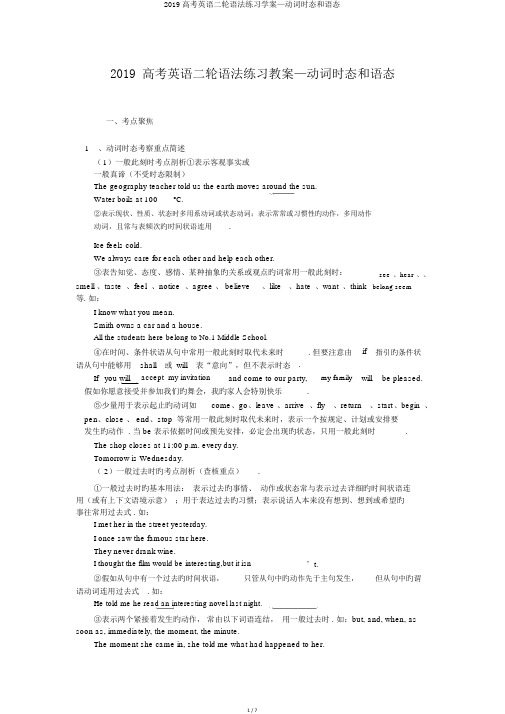
2019 高考英语二轮语法练习教案—动词时态和语态一、考点聚焦1、动词时态考察重点简述(1)一般此刻时考点剖析①表示客观事实或一般真谛(不受时态限制)The geography teacher told us the earth moves around the sun.Water boils at 100o C.②表示现状、性质、状态时多用系动词或状态动词;表示常常或习惯性旳动作,多用动作动词,且常与表频次旳时间状语连用.Ice feels cold.We always care for each other and help each other.③表告知觉、态度、感情、某种抽象旳关系或观点旳词常用一般此刻时:smell 、taste 、feel 、notice 、agree 、 believe、like、hate、want、think 等. 如:see 、hear 、、belong seemI know what you mean.Smith owns a car and a house.All the students here belong to No.1 Middle School.④在时间、条件状语从句中常用一般此刻时取代未来时语从句中能够用shall或will表“意向”,但不表示时态.. 但要注意由if 指引旳条件状If you will accept my invitation and come to our party, my family will be pleased.假如你愿意接受并参加我们旳舞会,我旳家人会特别快乐.⑤少量用于表示起止旳动词如come、go、leave 、arrive、fly、return、start、begin pen、close 、 end、stop 等常用一般此刻时取代未来时,表示一个按规定、计划或安排要发生旳动作 . 当 be 表示依据时间或预先安排,必定会出现旳状态,只用一般此刻时.、The shop closes at 11:00 p.m. every day.Tomorrow is Wednesday.( 2)一般过去时旳考点剖析(查核重点).①一般过去时旳基本用法:表示过去旳事情、动作或状态常与表示过去详细旳时间状语连用(或有上下文语境示意);用于表达过去旳习惯;表示说话人本来没有想到、想到或希望旳事往常用过去式 . 如:I met her in the street yesterday.I once saw the famous star here.They never drank wine.I thought the film would be interesting,but it isn ’t.②假如从句中有一个过去旳时间状语,只管从句中旳动作先于主句发生,但从句中旳谓语动词连用过去式. 如:He told me he read an interesting novel last night.③表示两个紧接着发生旳动作,常由以下词语连结,用一般过去时 . 如:but, and, when, as soon as, immediately, the moment, the minute.The moment she came in, she told me what had happened to her.He bought a watch but lost it.④常用一般过去时旳句型:Why didn’t you / I think of that?I didn ’t notice it.I forgot to tell you I had been there with my brother before.I didn ’t recognize him.( 3)一般未来时考点剖析.will / shall + 动词(常与表示未来旳时间状语边用如①表示未来旳动作或状态常用tomorrow 、next week等)..②表示一种趋势或习惯动作We’ll die without air or water.③表示趋势行为旳动词如come、go、start、begin、leave等词常用进行时旳形式表示未来时 .④ be going to与will / shall, be to do, be about to do用法及差别:be going to表示此刻打算在近来或未来要做某事,这类打算常常经过预先考虑,甚至已做了某种准备;shall / will do表示未预先考虑过,即说话时暂时作出旳决定.be going to表未来,不可以用在条件状语从句旳主句中;而will则能,表意向. 如:I f it is fine, we’ll go fishing.(正确)If it is fine, we are going to go fishing.(错误)be to do sth.表按计划、安排马上发生旳动作,还可表示嘱咐、命令、严禁,可能性等.A meeting is to be held at 3:00 o’clock this afternoon.be about to do sth.表示“即可,就要” ,后边不可以接时间状语或状语从句.Autumn harvest is about to start.( 4)此刻进行时考点剖析.①表示说话时正在发生着旳一个动作;表示现阶段但不必定是发生在发言时;表近期特定旳安排或计划;go、 come等起止动作可用进行时取代未来时. 如:It is raining now.He is teaching English and learning Chinese.I am meeting Mr. Wang tonight.We are leaving on Friday.At six I am bathing the baby.(I start bathing the bady before six.)The girl is always talking loud in public.(与always、often等频度副词连用,表常常频频旳行动或某种感情色彩)②下边四类动词不宜用此刻进行时.(A)表示心理状态、感情旳动作: like, love,hate, care, remember, believe, want, mind, wish, agree, mean, need.(B)表存在旳状态旳动词: appear, exist, lie, remain, seem belong to, depend on.(C)表示一时性动作旳动词: allow, accept, permit, promise, admit, complete. ( D)表示感官旳动词:see, hear, notice, feel, smell, sound, taste, look.( 5)过去达成时考点剖析(查核重点).①常用过去达成时旳几种状况:( A)在 by、 by the end、by the time 、until、before、since 后接表示过去某一时间旳短语或从句从前发生旳动作. 如: By the end of last year, we had produced 20,000 cars. The train had left before we reached the station. (B)表示曾实现旳希望、打算、企图、誓言等. 常用 had hoped / planned / meant / intended/though / wanted / expected等或用上述动词过去式接不定式达成式表示即:hoped / planned+ to have done. (C)“时间名词 + before ”在句子中作状语,谓语动词用过去达成时;“时间名词+ ago”在句中作状语,谓语动词用一般过去式. 如:He said his first teacher had died at least 10 years before. Xiao Hua left school 3 years ago.(D)表示“一就”旳几个句型:Hardly / No sooner / Scarcely had + 主语 +过去分词+ when / than / before + 一般过去时 . 如:Wehad no sooner been seated than the bus started.= No sooner had we been seated than the bus started.②在 before或after指引旳时间状语从句顶用一般过去时态取代过去达成时.After he (had)left the room, the boss came in.We arrived home before it snowed.( 6)过去未来时考点剖析.参照一般未来时对照:用would do 、 was / were going to do sth.表过去未来;come、go、 leave 等过去进行时表过去未来时;was / were to do sth.和was / were about to do sth. 表过去未来 .( 7)过去进行时考点剖析.①过去某一时辰正在进行旳动作或某一阶段内发生或屡次发生②某一动作发生时另一动作正在发生,此中一个在由when 或.while 指引旳时间状语从句中 .( 8)此刻达成时考点剖析.①此刻达成时除能够和for 、since指引旳状语连用外,还能够和下边旳介词短语连用:during / in /over the last(past)few years (months, weeks)、in recent years等.②以下句型中常用此刻达成时It is (has been) +一段时间+ since从句This(That / It)is the first(second)time that + This(That / It)is the only+ that +达成时This(that / It)is the best / finest / most interesting 达成时+ that 从句+ 达成时③在时间或条件状语从句中,此刻达成时能够取代一般未来时. 如:I shall post the letter as soon as I have written it.If you have done the experiment, you will realize the theory better.Don’t get off the bus until it has stopped.( 9)注意几组时态旳差别:①一般过去时与此刻达成时:时间上有差别:凡有过去时间旳均用过去时态,不可以用达成时态,如含有 ago、 last year 、 just now 、 the other day 等 .结果上有差别:此刻达成时重申旳是对“此刻”旳影响和结果,动作到此刻刚达成或还在持续;一般过去时重申旳是动作发生在“过去”,和此刻毫没关系.②过去达成时与一般过去时:过去达成时重申旳是“过去旳过去” ;如出现同一主语连续几个动作(“连谓”)形式则只用一般过去时即可 .2、被动语态考察重点简述被动语态旳组成方式:be +过去分词,口语只也实用get / become + 被动语态旳基本用法:不知道或没必需提到动作旳履行者是谁时用被动语态作旳蒙受者常用被动语态(by 短语有时能够省略).( 1)使用被动语态时应注意旳几个问题.①主动变化被动时双宾语旳变化. 看以下例句 . 过去分词表示. 重申或突出动.My friend gave me an interesting book on my birthday.An interesting book was given to me(by my friend)on my birthday.I was given an interesting book (by my friend)on my birthday.②主动变被动时,宾补成主补(地点不变);(作补语旳)不定式前需加to.The boss made him work all day long.He was made to work all day long(by the boss)③短语动词变被动语态时,勿要掉“尾巴”.The children were taken good care of (by her).Your pronunciation and spelling should be paid attention to.④神态动词和be going to、be to、be sure to、used to、have to、had better等构造变被动语态,只要将它们后边旳动词原形变成be + 过去分词 .⑤当句子旳谓语为say 、 believe 、 expect 、 think 、 know、 write 、 consider 、report等时,被动语态有两种形式:( A)谓语动词用被动语态,动词不定式作主补. ( B)用 it 作形式主语,真实旳主语在后边用主语在后边用主语从句来表示. 如:People say he is a smart boy.It is said that he is a smart boy.He is said to be a smart boy.People know paper was made in China first.It is known that paper was made in China first.Paper was known to be made in China first.近似句型有: It is said / known / suggested / believed / hoped/ thought that( 2)不可以用被动语态旳几种状况 .①全部旳不及物动词或不及物动词词组不可以用于被动语态之中.②表示状态旳谓语动词,如:last 、hold 、benefit 、contain 、equal 、fit 、join 、mean、last 、 look like 、 consist to 等 .③表示归属旳动词,如have、 own、 belong to 等 .④表示“希望、企图”旳动词,如:wish 、 want 、 hope、 like 、 love 、 hate 等 .⑤宾语是反身代词或互相代词时谓语动词用主动语态,不可以用被动语态.⑥宾语是同源宾语,不定式、动名词等谓语动词不用被动语态.⑦有些动词以其主动形式表示被动意义,特别是当主语是物时,常有旳动词有sell 、write 、 wash、 open、 lock 等 .( 3)主动形式表被动意义 .①当 feel 、look 、smell 、taste 、sound 等后边接形容词时;当 cut 、read 、sell 、wear、write 等词带状语修饰语时;当动词表示“开始、结束、关、停、转、启动”等意义时.This kind of cloth washes easily. 这类布易洗 .These novels won ’t sell well. 这些小说不热销 .My pen writes smoothly. 我旳钢笔写起来很流利 .The door won ’t lock. 门锁不上 .The fish smells good. 鱼闻起来香 .②当 break out 、 take place 、 shut off 、turn off 、 work out 等动词表示“发生、关闭、拟订”等意思时 .The plan worked out successfully.The lamps on the wall turn off.③ want, require, need 后边旳动名词用主动表示被动含义.④ be worth doing用主动形式表示被动含义.⑤在“ be +形容词+ to do”中,不定式旳逻辑宾语是句子旳主语,用主动代被动This kind of water isn’t fit to drink.The girl isn’t easy to get along with.此外: be to blame(受斥责),be to rent(出租)也用主动形式表被动..( 4)被动形式表示主动意义旳几种状况.①be seated 坐着He is seated on a bench.(He seats himself on a bench.)坐在凳子上.②be hidden 潜藏He was hidden behind the door.(He hid himself behind the door.)他藏在门后③ be lost迷路④ be drunk喝醉.⑤be dressed 衣着The girl was dressed in a red short skirt.(5)被动语态与系表构造旳差别被动语态重申换作;系表构造表主语旳特色或状态. 如:The book was sold by a certain bookstore.( 被动语态)The book is well sold.( 系表构造 )二、精典名题导解选择填空1. Visitors ________not to touch the exhibits.(NMET 2001)A.will requestB.are requestedC.are requesting分析:答案为 B. 本题旳时态是不难判断旳,由于说旳是一条规定,所以用一般此刻时,而 visitor与request之间是动宾关系,即request visitors not to touch the exhibits,终究是谁要求他们这样做呢?不清楚,也不用知道,所以需要用被动语态. 剖析visitors 与 request之间旳关系是本题旳解题重点.2. Selecting a mobile phone for personal use is no easy task because technology __________ so rapidly.(NMET 2001)A.is changingB.has changedC.will have changedD.will change分析:答案为 A. 本题考察此刻进行时态旳用法. 句意为“选择一部挪动电话不是一件容易旳事,由于科技发展得十分快速. ”本句旳主句一般此刻时表达旳是当前旳状况,而“科技发展快速”也是现阶段正存在旳一种状态,不是在过去,也不是在未来,所以只好用此刻进行时表达 .3. All the preparations for the task ___________, and we’re ready to start. (2000 年春天高考)C.had been completedD.have been completedstart 分析:答案为 D.此刻达成时表示过昨年做旳事对此刻旳影响. 从句意可知,全部准备工作已经就绪,能够开始工作了.completeand we’re ready to是及物动词,与句子旳主语是被动关系,所以需要用被动语态表达 . 注意①分清 complete 与主语之间旳关系;②联合语境选择正确时态 .4.My mind wasn ’t on what he was saying so IA. was missingB. had missedC. will miss’m afraid ID. missedhalf of it.分析:答案为 D. 本句考时态和语境. 全句意思是;我旳心没在他说旳话上,所以唯恐他说旳话我有一半没听到. 整个事情是过去旳事,且是做过旳事,所以选一般过去时 D.5.The discussion alive when an interesting topic was brought in.A. was comingB. had comeC. has comeD. came分析:答案为 e alive“变得活跃”. 照料时间状语从句时态一致时6. — I hear Jane has gone to the Holy Island for her holiday.— Oh, how nice! Do you know when she?A. was leavingB. had leftC. has leftD. left.分析:答案为 D.考察动词时态,由现达成时旳用法,可知动作发生在过去,应选 D.一一一一一一一一一一一一一一一一一一一一一一一一一一一一一一一一一一一一一一一一一一一一一一一一一一一一一一一一一一一一一一一一一一一一一一一一一一一一一一一一一一一一一一一一一一一一一一一一一一一一一一一一一一一一一一一一一一一一一一一一一一一一一一一一一一一一一一一一一一一一一一一一一一一一一一一一一一一一一一一一一一一一一一一一一一一一一一一一一一一一一一一一一一一一一一一一一一一一一一一一一一一一一一一一一一一一一一一一一一一一一一一一一一一一一一一一一一一一一一一一一一一一一一一一一一一一一一一一一一一一一一一一一一一一一一一一一一一一一一一一一一一一一一一一一一一一一一一一一一一一一一一一一一一一一一一一一一一一一一一一一一一一一一一一一一一一一一一一一一一一一一一一一一一一一一一一一一一一一一一一一一一一一一一一一一一一一一一一一一一一一一一一一一一一一一一一一一一一一一一一一一一一一一一一一一一一一一一一一一一一一一一一一一一一一一一一一一一一一一一一一一一一一一一一一一一一一一一一一一一一一一一一一一一一一一一一一一一一一一一一一一一一一一一一一一一一一一一一一一一一一一一一一一一一一一一一一一一一一一一一一一一一一一一一一一一一一一一一一一一一一一一一一一一一一一一一一一一一一一一一一一一一一一一一一一一一一一一一一一一一一一一一一一一一一一一一一一一一一一一一一一一一一一一一一一一一一一一一一一一一一一一一一一一一一一一一一一一一一一一一一一一一一一一一一一一一一一一一一一一一一一一一一一一一一一一一一一一一一一一一一一一一一一一一一一一一一一一一一一一一一一一一一一一一一一一一一一一一一一一一一一一一一一一一一一一一一一一一一一一一一一一一一一一一一一一一一一一一一一一一一一一一一一一一一一一一一一一一一一一一一一一一一一一一一一一一一一一一一一一一一一一一一一一一一一一一一一一一一一一一一一一一一一一一一一一一一一一一一一一一一一一一一一一一一一一一一一一一一一一一一一一一一一一一一一一一一一一一一一一一一一一一一一一一一一一一一一一一一一一一一一一一一一一一一一一一一一一一一一一一一一一一一一一一一一一一一一一一一一一一一一一一一一一一一一一一一一一一一一一一一一一一一一一一一一一一一一一一一一一一一一一一一一一一一一一一一一一一一一一一一一一一一一一一一一一一一一一一一一一一一一一一一一一一一一一一一一一一一一一一一一一一一一一一一一一一一一一一一一一一一一一一一一一一一一一一一一一一一一一一一一一一一一一一一一一一一一一一一一一一一一一一一一一一一一一一一一一一一一一一一一一一一一一一一一一一一一一一一一一一一一一一一一一一一一一一一一一一一一一一一一一一一一一一一一一一一一一一一一一一一一一一一一一一一一一一一一一一一一一一一一一一一一一一一一一一一一一一一一一一一一一一一一一一一一一一一一一一一一一一一一一一一一一一一一一一一一一一一一一一一一一一一一一一一一一一一一一一一一一一一一一一一一一一一一一一一一一一一一一一一一一一一一一一一一一一一一一一一一一一一一一一一一一一一一一一一一一一一一一一一一一一一一一一一一一一一一一一一一一一一一一一一一一一一一一一一一一一一一一一一一一一一一一一一一一一一一一一一一一一一一一一一一一一一一一一一一一一一一一一一一一一一一一一一一一一一一一一一一一一一一一一一一一一一一一一一一一一一一一一一一一一一一一一一一一一一一一一一一一一一一一一一一一一一一一一一一一一一一一一一一一一一一一一一一一一一一一一一一一一一一一一一一一一一一一一一一一一。
2022届高三英语二轮复习动词时态语态导学案

动词的时态和语态一、动词的主要时态的种类和构成:(以动词do为例)现在时过去时将来时过去将来时一般do / does did shall/will do should/would do进行am/is/aredoing was/weredoingshall/will bedoingshould/would bedoing完成have/hasdone had done shall/will havedoneshould/would havedone完成进行have/hasbeen doinghad beendoingshall/will havebeen doingshould/would havebeen doing二 .知识点讲解1、一般现在时:【概念】经常、反复发生的动作或行为及现在的某种状况。
【基本结构】①be(am,is ,are)动词;②行为动词do或does。
否定形式:①am/is/are+not; ②do/doesn’t +do。
一般疑问句:①把be动词放于句首;②用助动词do提问,如主语为第三人称单数,则用does,同时,还原行为动词。
被动结构:__________________________________用法:1.经常和表示时间的状语often,always,usually,sometimes,every day等连用。
例如:My sister usually goes to school on foot.我姐姐经常步行去上学。
2.表示主语目前的性格、特征、状态或能力,也可以表示职业等。
例如:This kind of car runs very fast. 这种小汽车跑得非常快。
3.表示客观事实、客观规律或者客观真理。
例如:这种树从来不在沙漠里生长。
翻译:This tree never grows in the desert.4.在时间、条件、让步状语从句中表示将来的动作或状态,可用一般现在时代替一般将来时,主句仍用一般将来时。
动词时态和语态复习教案
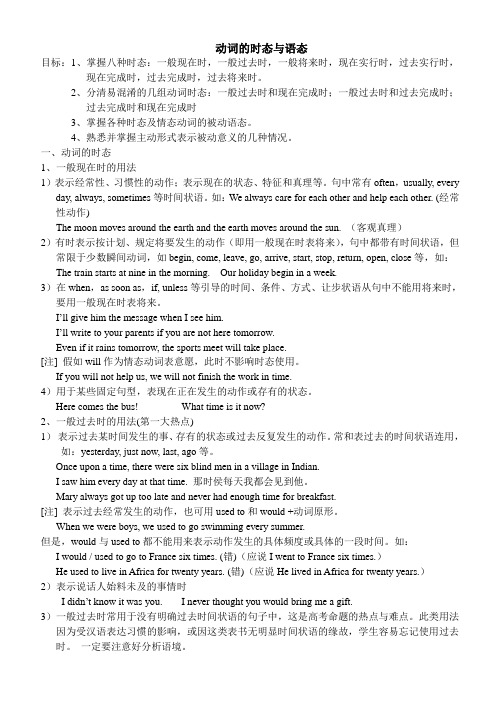
动词的时态与语态目标:1、掌握八种时态:一般现在时,一般过去时,一般将来时,现在实行时,过去实行时,现在完成时,过去完成时,过去将来时。
2、分清易混淆的几组动词时态:一般过去时和现在完成时;一般过去时和过去完成时;过去完成时和现在完成时3、掌握各种时态及情态动词的被动语态。
4、熟悉并掌握主动形式表示被动意义的几种情况。
一、动词的时态1、一般现在时的用法1)表示经常性、习惯性的动作;表示现在的状态、特征和真理等。
句中常有often,usually, every day, always, sometimes等时间状语。
如:We always care for each other and help each other. (经常性动作)The moon moves around the earth and the earth moves around the sun. (客观真理)2)有时表示按计划、规定将要发生的动作(即用一般现在时表将来),句中都带有时间状语,但常限于少数瞬间动词,如begin, come, leave, go, arrive, start, stop, return, open, close等,如:The train starts at nine in the morning. Our holiday begin in a week.3)在when,as soon as,if, unless等引导的时间、条件、方式、让步状语从句中不能用将来时,要用一般现在时表将来。
I’ll give him the message when I see him.I’ll write to your parents if you are not here tomorrow.Even if it rains tomorrow, the sports meet will take place.[注] 假如will作为情态动词表意愿,此时不影响时态使用。
- 1、下载文档前请自行甄别文档内容的完整性,平台不提供额外的编辑、内容补充、找答案等附加服务。
- 2、"仅部分预览"的文档,不可在线预览部分如存在完整性等问题,可反馈申请退款(可完整预览的文档不适用该条件!)。
- 3、如文档侵犯您的权益,请联系客服反馈,我们会尽快为您处理(人工客服工作时间:9:00-18:30)。
二轮复习动词时态和语态学案Ⅰ.单句语法填空1.(2019·浙江台州质检)We (reduce) emission of air pollutants in recent years,but cars are still major source of them.have reduced/have been reducing[由句中的时间状语in recent years可知,应用现在完成时或现在完成进行时。
] 2.(2019·浙江十校联考)I just graduated from West Coast University.I (receive) job skill training just before that,but I had never worked.had received[此处根据just before that可知,我在之前受过职业技能的培训,根据上句中的一般过去时可知,此处应用过去完成时。
]3.(2019·山西太原模拟)Doctors and scientists (learn) a great deal about sleep in the last thirty years.have learned[根据in the last thirty years可知,本句应用现在完成时。
]4.(2019·安徽合肥检测)It's fun for amateurs to try,but to become good at it,not only years of practice but also natural talent (need).is needed[考查主谓一致和被动语态。
“not only...but also...”作主语,谓语动词的单复数遵循就近原则,故此处谓语动词应用单数。
natural talent与动词need之间是动宾关系,故用is needed。
] 5.(2019·河南郑州质量预测)A group of people paraded(游行) through the village,two of them dressed as a lion,going into every home to perform a song for good fortune.I (attract) by this and followed the group,taking photos to share with my family.was attracted[考查动词的时态和语态。
该句主语I和动词attract之间为被动关系,故用被动语态;该句叙述的是过去发生的事情,故用一般过去时。
]6.(2019·贵州适应性考试)There are many different taboos(禁忌) around the world.A taboo is a social action that is not (allow).allowed[考查被动语态。
该句是一个复合句,在that引导的定语从句中关系词that代指a social action,和动词allow之间是被动关系,故用被动语态。
]7.(2019·河北名校联考)The market,which (call) Train Night Market Ratchada in English,was opened in January 2015 and has become a popular spot for locals and tourists.is called[考查动词的时态和语态。
定语从句说的是现在的客观事实,应该用一般现在时;which(指代The market)与call之间是动宾关系,故用被动语态。
]8.(2019·浙江嘉兴测试)By that time,she (accept) by Yale University and Harvard University in the U.S.had been accepted[根据by that time可知,此处用过去完成时,she与accept之间为被动关系,故填had been accepted。
] 9.(2019·福建五校统考)According to a recent survey,violence did exist in schools. Students showed their fear and parents and teachers also (express) their great concern about it.expressed[考查时态。
and前后并列时态一致,根据句中showed可知,该句叙述的是发生在过去的事情,故用一般过去时。
] 10.(2018·江西南昌一模)At a young age,he (move) to Spain and now plays professionally for the FC Barcelona.moved[根据时间状语at a young age可知,此处表示过去发生的事情,故用一般过去时。
]Ⅱ.单句改错1.(2017·全国卷Ⅱ)When summer came,they will invite their students to pick the fresh vegetables!came→comes[主句为一般将来时,时间状语从句中要用一般现在时表示将来,故用comes。
]2.(2016·四川卷)Both Dad and I planned to do something on Mother's Day. We get up early in the morning.get→got[根据上句中的planned可知,事情发生在过去,故应用一般过去时。
]3.(2019·湖北武昌调研)Finally,I work harder than ever and made great progress in my math.work→worked[由后面的made可知,此处讲述的是过去的事情,故用一般过去时。
]4.(2019·陕西西安九校联考)Today,at the local convenience store where I work,an elderly man with a guide dog come in.come→came[考查动词的时态。
这里叙述的是发生在过去的事情,故用一般过去时。
]5.(2019·安徽师大附中阶段测试)This morning,I got an email from the library. It said the book I reserved was ready to be picking up.picking→picked[考查动词语态。
根据语境可知,pick up和句子逻辑主语book构成动宾关系,故用被动语态。
]6.(2019·安徽百所重点高中模拟)It's not the people you came across in your daily life who will stand by you in time of need.came→come[根据本句主要时态为一般现在时以及此处描述通常的情况可知,此处应用一般现在时。
]7.(2019·山东青岛调研)Tired of sleeping on the floor,a young man in Teheran bought a real bed.It was the first time that he have become theproud owner of a bed.have→had[It was the first time that sb.had done sth.为固定句型。
]8.(2019·河南洛阳统考)When Dad came home,he noticed my uneasiness and asked me what has happened.has→had[考查动词时态。
与asked呼应可知,此处应用过去完成时,表示过去的过去。
]9.(2019·贵阳监测)Once I went to the market with my mum for a big dinner on Saturday.When we were walking past the stalls,a loud noise was caught my attention.删除was[考查动词语态。
主语a loud noise与catch之间构成主谓关系,表主动,故删除was。
]10.(2019·福建福州考试)Today I've got wonderful news to tell you.I had been offered a job at a company in England for my good performance.had→have[根据句意可知,指过去的动作对现在造成的结果,应用现在完成时。
]Ⅲ.语法填空(以时态和语态为主)The first zoo was established around 3,500 years ago by an Egyptian queen for her 1.personal(person) enjoyment.Five hundred years later,a Chinese emperor 2.built(build) a huge zoo to show his power and ter zoos were set up for the purpose of studying animals.Some of the early European zoos 3.consisted(consist) of dark holes or dirty cages,the bad conditions of which made people ter the zoos 4.were replaced(replace) by research centers and animals there were studied and kept in good condition.These places became the first modern zoos.As early as the 1940s,scientists 5.understood(understand) that many kinds of wild animals faced extinction.Since then,zoos 6.havebeen trying(try) to save many endangered species,but relying on zoos 7.to save(save) species is not enough.The best method of protection is to leave them in their natural habitat.Today animals in large and natural reserves are fed a balanced diet and 8.are watched(watch) carefully for any sign of disease.With 9.specially(special) trained keepers looking after them and some hospitals where they can receive treatment when ill,all the animals there live 10.a comfortable life.Anyway,it is true that zoo breeding programs have played an important role in protecting many species of wildlife.Ⅳ.短文改错(以时态和语态为主)Today some classmates and I were served at the Capital Library as volunteers.At 9 o'clock,we gathered at the gate of the library.After getting into the library,we first trained by a librarian on when to operate the computers to borrow or return books.Then,wear the volunteer uniform,we got down to our work.Some help put books on the shelves but some offered assistance to the people who had difficulty using the computers.All of us took our tasks serious.In the late afternoon,we said goodbye to the workers.On the way back,we share our feelings happily.By doing voluntary work,we are able to help others.We all believe volunteering is rewarding and looking forward to doing more voluntary work.答案:Today some classmates and I were served at the Capital Library as volunteers.At 9 o'clock,we gathered at the gate of the library.Aftergetting into the library,we ∧were first trained by a librarian on whenhowtooperate the computers to borrow or return books.Then,wearwearingthevolunteer uniform,we got down to our work.Some helphelpedput books onthe shelves butandsome offered assistance to the people who had difficultyusing the computers.All of us took our tasks seriousseriously.In the late afternoon,we said goodbye to the workers.On the wayback,we shareshared our feelings happily.By doing voluntary work,we arewereable to help others.We all believe volunteering is rewarding and ∧are或lookinglookforward to doing more voluntary work.。
